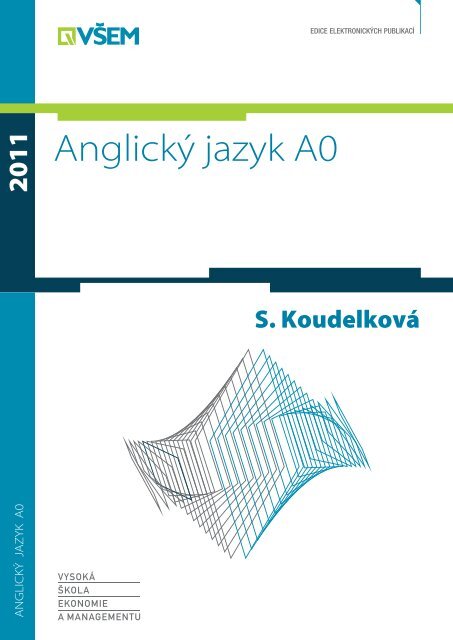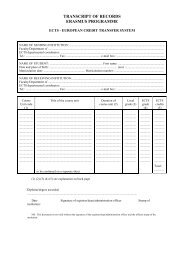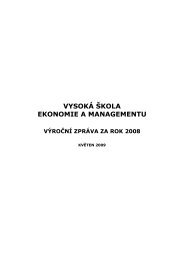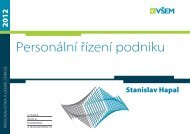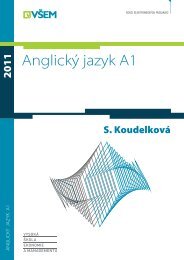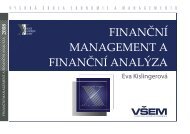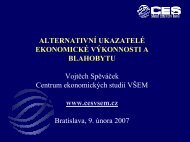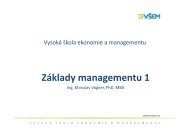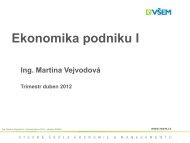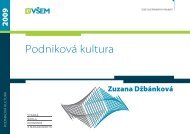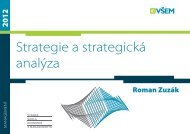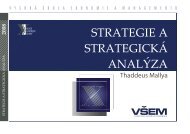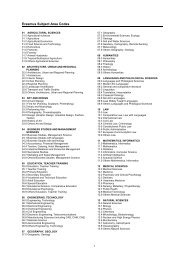Anglický jazyk A0 - VŠEM
Anglický jazyk A0 - VŠEM
Anglický jazyk A0 - VŠEM
You also want an ePaper? Increase the reach of your titles
YUMPU automatically turns print PDFs into web optimized ePapers that Google loves.
Studijní opora VŠEM (edice elektronických publikací – kestažení pro kombinované studenty) - strukturaKurz <strong>A0</strong>Cíl kurzu: cílem nepovinného kurzu <strong>A0</strong> je, aby si student osvojil nejzákladnější okruhyanglické gramatiky a slovní zásoby a byl tak připravený absolvovat kurz A1, který jepovinný.Studijní literatura:Základní literatura:Studijní opora VŠEM.Studijní literatura:MURPHY, R.: Essential Grammar in Use with Answers and CD-ROM, Cambridge UniversityPress, ISBN 978-O-521-67543-7.MC CARTHY, M., O’DELL, F..: English Vocabulary in Use Elementary Book and CD-ROM,Cambridge University Press, ISBN 978-O-521-61464-1.Rozšiřující literatura:HAUER, T., MAŠEK, J.: General English, Book A1, Third Edition, VŠEM, Praha 2009, ISBN978-80-86730-49-3.MURPHY, R.: English Grammar in Use with Answers and CD-ROM, Cambridge UniversityPress, ISBN 978-O-521-53762-9.REDMAN, S.: English Vocabulary in Use, Pre-intermediate and intermediate, Book andCD-ROM Pack, Cambridge University Press, ISBN 978-O-521-61465-8.Doplňující literatura:Překladové a výkladové slovníky všeobecné slovní zásoby.
Struktura kurzu:Probírané gramatické okruhy:1) Present simple x present continuous2) Past simple x past continuous3) Present perfect simple x present perfect continuous4) Past perfect simple x past perfect continuous5) Expressing future: will x going to x present continuous6) Tense revision, subject x object question7) Reported speech8) Conditional mode, conditional clauses9) Modal verbs, passive voice10) Articles, countabilityOblasti slovní zásoby:1) Language, everyday activities2) Countryside, town, travelling3) Jobs, education4) Shopping, Clothes5) Family, health6) Global problems – war, environment, politics, economics7) Leisure time, sports8) Describing people, feelings9) Countries, languages, cultures, weather10) Food
Chapter 1Grammar: present simple vs. present continuousVocabulary: language, everyday activitiesGoals and OutcomesIn this chapter you will learn how to use different present tenses. You will be able to talkabout your everyday activities and about the things you are doing at the moment.IntroductionMy brother is still a student. He usually gets up at 6.30. He brushes his teeth, he hasbreakfast and then he gets dressed. He doesn’t take a shower in the morning. He leaveshome at 7.15 and he goes to school by bus. He has lunch at a school canteen. He has alot of hobbies so he often comes home late. At the moment he is watching TV. He isn’tstudying although they are writing a test tomorrow. He isn’t a very good student.1) Have a look at the verb highlighted in yellow. What is the infinitive? Whichperson 1 is it? Is it singular or plural? Find the negative in the text.2) What are the other forms of the verb to be – both positive and negative?3) Look at the blue verbs. Which person is it? Is it singular or plural? What arethe infinitives?4) One blue example is negative. Which auxiliary verb 2 do you use in negativesand questions in present simple?5) Have a look at the green words. Which tense is it? Which auxiliary verb do weuse? What is the form of the full verb?6) Look at the second green example. How do we form the negative?1 = osoba2 = pomocné sloves
7) Which tense do we use for regular activities? Which tense do we use foractions happening now?Structure summaryPresent simpleVerb TO BE+ - ?I AM (`M) AM NOT AM IWE/THEY/YOU ARE (`RE) ARE NOT (AREN`T)ARE WE/THEY/YOUHE/SHE/IT IS (`S) IS NOT (ISN`T) IS HE/SHE/ITVerbs+ - ?I/WE/THEY/YOU WORK DO NOT (DON`T) WORK DO YOU WORKHE/SHE/IT WORKS DOES NOT (DOESN`T) WORK DOES HE WORK• work > works• study > studies (y>i after a consonant)• finish > finishes (after sh, s, ch, x add es)• go > goes, do > does, have >hasUse present simple for things you do every day, week, year or which are always true, weoften use the simple present with adverbs of frequency (always, often, sometimes,usually, hardly ever, never). Adverbs of frequency go before the main verb but after be. 3He usually gets up early. * He is always late.3 Přítomný prostý čas užíváme pro aktivity, které děláme obvykle, denně, každý měsíc apod. nebo pro situace,které jsou trvalé. Často používáme příslovce frekvence (vždy, často, někdy, obvykle, zřídka, nikdy). Totopříslovce je ve větě před hlavním slovesem, ale až po slovesu být.
Present continuousverb TO BE – verb+ing• cook > cooking, study > studying, live > living, run >running+ - ?I AM (`M) WORKING AM NOT WORKING AM I WORKINGWE/THEY/YOUARE (`RE)WORKINGARE NOT (AREN`T)WORKINGARE YOU WORKINGHE/SHE/IT IS (`S) WORKING IS NOT (ISN`T) WORKING IS HE WORKINGUse present continuous for things happening now, at this moment. 4Ex. I am writing an email. * I write emails every day.Section 1 – present simple vs. present continuous1.1 Write the short form (she’s).1. it is it’s 3. we are ……………. 5. you are not …………….2. he is not ……………. 4. they are ……………. 6. I am …………….1.2 Write am, is or are1. I am young. 4. This bag ……………. very heavy.2. My brother ……………. a student. 5. They ……………. at home.3. I ……………. at school. 6. You ……………. late.1.3 Write true sentences, positive or negative.1. (it/ cold today) It’s cold OR It isn’t cold.4 Přítomný průběhový čas používáme pro děje, které probíhají teď, v tuto chvíli.
2. (diamonds/ expensive) …………………………………………………………………3. (I/ tired) …………………………………………………………………4. (my hands/ cold) …………………………………………………………………5. (Paris/ in the UK) …………………………………………………………………1.4 Make questions with the words.1. (is/ at school/ your brother) Is your brother at school?2. (your friends/ are/ here) …………………………………………………………………3. (are/ from/ where/ you) …………………………………………………………………4. (is/ near here / the bank) …………………………………………………………………5. (are/ open today/ the shops) …………………………………………………………………1.5 Write these verbs with –s or -es1. read reads 3. study ……………. 5. have …………….2. go ……………. 4. finish ……………. 6. think …………….1.6 Complete the sentences. Use:open teach wear meet close like cost speak1. He speaks four languages.2. My mother is a teacher. She …………………………….. history.3. The shop …………………………….. at 9 a.m. and …………………………….. at 6 p.m.4. These shoes are expensive. They …………………………….. a lot of money.5. My children …………………………….. chocolate.6. Her job is interesting. She …………………………….. a lot of people.7. Julia always …………………………….. nice clothes.
1.7 Write sentences from these words. Use the right form of the verb.1. (to the theatre/never/I/go) I never go to the theatre.2. (dinner/we/have/usually/at 7) …………………………………………………………………3. (often/I/in bed/read) …………………………………………………………………4. (Sue/parties/enjoy/always) …………………………………………………………………5. (My father/walk/to work/sometimes) …………………………………………………………………1.8 Write the negative.1. They play the piano well. They don’t play the piano well.2. I know your phone number. …………………………………………………………………3. He drinks coffee. …………………………………………………………………4. It happens very often. …………………………………………………………………5. You work very hard. …………………………………………………………………1.9 Write questions with Do … ? and Does … ?1. I like chocolate. How about you? Do you like chocolate?2. Jim plays tennis. How about his friends? ………………………………………………………3. Sue works hard. How about her sister? ………………………………………………………4. You live near here. How about Tom? ………………………………………………………5. She speaks three languages. How about you? ………………………………………………………1.10 What are these people doing at the moment? Use these verbs to completethe sentences?1. She’s eating an orange. (eat) 3. He ………………………… for a bus. (wait)2. They ………………………… on the floor. (sit) 4. She ………………………… lunch. (have)
1.11 What’s happening now? Write the true sentences.1. (it/ rain) It is snowing OR It isn’t snowing.2. (I/ eat) ……………………………………………………3. (I/ listen/ to music) ……………………………………………………4. (the sun/ shine) ……………………………………………………5. (I/ wear/ shoes) ……………………………………………………1.12 Complete the questions.1. What are you reading? (you/ read) 3. Why ………………………………? (she/cry)2. What ………………………………? (you/cook) 4. Why ………………………………at me? (he/ look)1.13 Complete the sentences with am/ is/ are or do/ don’t/ does/ doesn’t.1. Excuse me, do you speak English?2. “What’s the time?” “I ……………………… know.”3. Tom ……………………… having a shower at the moment.4. “Where ……………………… you come from?” “Australia.”5. What’s funny? Why ……………………… you laughing?1.14 Put the verbs in the present continuous or the present simple.1. Look! He (leave) …………………………………………. the house.2. Quiet please! I (write) …………………………………………. a test.3. She usually (walk) …………………………………………. to school.4. But look! Today she (go) …………………………………………. by bike.5. Every Sunday we (go) …………………………………………. to see my grandparents.6. He often (go) …………………………………………. to the cinema.7. We (play) …………………………………………. Monopoly at the moment.
8. The child often (cry) …………………………………………..9. I (not / do) …………………………………………. anything at the moment.10. (watch / he) ………………………………………….the news regularly?Section 2 – language, everyday activities1.15 Complete the words in Czechgrammar word meaning exampleCzechlanguage1. NOUN a person or thing book, man, dog2. PRONOUN used instead of noun I, it, she3. VERB something we do do, read, work4. ADJECTIVE describes a nounsmall, cheap,bad5. ADVERB describes a verbslowly, well,badly6. CONJUNCTION connects 2 sentencesand, because,but7. PREPOSITIONa word used before a noun orpronounat, in, on, by8. SINGULAR only onecar, house,woman9. PLURAL more than onecars, houses,women10. QUESTIONtype of sentence ending with aquestion markWhere do youlive?Are you astudent?
11. ANSWER a reply to a questionIn Prague.Yes, I am.1. 16 Complete the text. Use:have a shower go out get up listen to musicget home have lunch do the shopping have breakfastmake dinner watch TV go for a walk read booksDuring the week I usually wake up at 6 a.m. I sometimes lie in bed for 5 minutes butthen I have to …………………………….. 1 Then I go to the bathroom. I always…………………………….. 2 and then I brush my teeth. Then I go to the kitchen and……………………………. 3 I go to work by car and I always ……………………………. 4 in the car. Iusually ……………………………. 5 at 1 p.m. and then I have a cup of coffee. I finish work at 5p.m. and I ……………………………. 6 at 6.15. p.m. Then I …………………………….. 7 In the evening Iusually ……………………………. 8 or …………………………….. 9 I usually go to bed at 11. p.m. At theweekend I often ……………………………. 10 or I go to the supermarket and…………………………….. 11In the evenings I usually ……………………………. 12 with my friends.1.17 Complete sentences about yourself1. I usually wake up at ……………………………. .2. I usually have ……………………………. for breakfast.3. I go to work by ……………………………. .4. I usually have dinner at …………………………….5. In the evenings I usually ……………………………. or ……………………………..
Chapter 2Grammar: past simple vs. past continuousVocabulary: countryside, town, travellingGoals and OutcomesIn this chapter you will learn how to speak about travelling and how to describe yourtown and country. You will learn how to use different past tenses to describe your pastexperience.IntroductionWhen I was 17 I went on holiday with my parents to Spain. My parents rented a housenear the beach. The weather was great. When we arrived to the beach, the sun wasshining and people were swimming and sunbathing. Everybody was having a great time.But I was a teenager and I didn’t want to be on holiday with my parents. I wanted to bewith my friends. I was angry and I didn’t smile once in ten days.1) What are the infinitives of yellow verbs? Are they regular or irregular?2) Have a look at the words highlighted in blue. How do you form the negative?Find another example in the text.3) Complete the question with an auxiliary verb. ______ you want to go onholiday?4) Have a look at the example highlighted in green. Which tense is it? How do weform it? Find more examples in the text.5) Look at the sentence When we arrived to the beach, the sun was shining.Which tense refers to completed action and which refers to the action inprogress?
Structure summaryPast simpleVerb TO BE+ - ?I/ HE/SHE/IT WAS WAS NOT (WASN`T) WAS I/HE/SHE/ITWE/THEY/YOU WERE WERE NOT (WEREN`T) WERE WE/THEY/YOUVerbs1) regular +ED• work > worked• like > liked (add only d if verb finishes in e)• study > studied (y>i after a consonant)• stop > stopped (consonant-vowel- consonant, double the finalconsonant)2) irregular (go > went, do > did, have > had, see > saw etc.)+ - ?I/WE/THEY/YOU/HE/SHE/ITWORKEDDID NOT (DIDN`T)WORKDID YOU WORKUse the past simple for a completed action in the past. 55 Minulý prostý čas používáme pro ukončené děje v minulosti.
Past continuouswas/were – verb+ing+ - ?I/ HE/SHE/IT WAS WORKINGWAS NOT (WASN`T)WORKINGWAS HE WORKINGWE/THEY/YOUWEREWORKINGWERE NOT (WEREN`T)WORKINGWERE YOUWORKINGUse the past continuous to describe an action in progress at a specific moment in thepast. 6Ex. He came home (It happened at once) when I was preparing dinner. (It took sometime)Section 1 - past simple vs. past continuous2.1 Change the sentences from present to past.1. I am tired. I was tired yesterday.2. Where are you now? …………………………………………………………… yesterday?3. It isn’t open now. …………………………………………………………… at the weekend.4. He is in Italy this month. …………………………………………………………… last month.5. We aren’t at home today. …………………………………………………………… on Monday.2.2 Complete the dialogues with was, wasn’t, were, weren’t.A: Where were1 you on Saturday? B: We ………………………2 at the party.A: ………………………3 it good? B: No, it ………………………4 . The music ………………………5terrible.6 Minulý čas průběhový používáme pro děje, které v minulosti probíhaly po nějakou dobu.
2.3 Complete the sentences with a verb in the past simple. (All verbs areregular.)stay book live arrive turn off land turn on watch1. I turned off the TV.2. They …………………………….. the football on TV last night.3. He …………………………….. late for work and the boss was angry.4. When the plane …………………………….. she …………………………….. her mobile phone.5. They …………………………….. a table in the restaurant.6. I …………………………….. with my parents when I was a student.7. We …………………………….. in a beautiful hotel last year.2.4 Write the past simple of these verbs.1. get got 5. go ……………….. 9. know ……………….. 13. tell ………………..2. break ……………….. 6. have ……………….. 10. take ……………….. 14. sit ………………..3. come. ……………….. 7. eat ……………….. 11. lose ……………….. 15. see ……………….4. buy ……………….. 8. speak ……………….. 12. think ……………….. 16. make………………2.5 Put the verbs in the correct form in the paste tense.Last Friday Caroline flew 1 (fly) from Paris to Amsterdam. She ……………….. 2 (get) up at 5a.m. and ……………….. 3 (have) breakfast. At 5.30 she ……………….. 4 (leave) home and……………….. 5 (drive) to the airport. When she ……………….. 6 (get) there she ……………….. 7(check) in. Then she ……………….. 8 (sit) at a café and ……………….. 9 (wait) for her flight.When she ……………….. 10 (arrive) to Amsterdam she ……………….. 11 (take) a taxi to the hotel.2.6 Complete these sentences with the verb in negative.1. I studied English but I didn’t study French.2. I saw Sue but ………………………………………… Tom.
3. We worked on Monday but we ………………………………………… on Tuesday.4. I watched TV last night but she ………………………………………… last night.5. I slept well last night but he ………………………………………… last night.2.7 Write questions in the past using these words.1. (Jane / the window / open) Did Jane open the window?2. (she / home / walk) ………………………………………………3. (you / in the garden / work / yesterday) ………………………………………………4. (he / a letter / write) ………………………………………………5. (go / late / to bed / the children) ………………………………………………2.8 Complete the sentences in the past simple tense.Last year I spent1 (spend) my holiday in Ireland. I …………………… 2 (travel) with twofriends and we …………………… 3 (visit) a lot of interesting places. In the evenings we usually…………………… 4 (go) to a pub. One night we even …………………… 5 (learn) some Irish dances.It …………………… 6 (not/ rain) a lot. But we …………………… 7 (see) a beautiful rainbow. Where…………………… 8 (spend/ you) your last holiday?2.9 Complete the sentences in the past continuous tense.1. He met his wife when he was working in Paris.2. They ………………………….. (wait) for us when we arrived.3. He ………………………….. (not/ sleep) when they broke his window.4. I …………………………….. (drive) when she called me.5. She ………………………….. (make) dinner when they came.6. It ………………………….. (not/ rain) when I woke up.7. We ………………………….. (watch) TV when the bell rang.
2.10 Complete the question. Use what/where/why if necessary.1. (it/ rain) Was it raining when you got up? No, I was sunny.2. (you/ do) ………………………………………………… at 2 p.m. I was sleeping.3. (John/ wear) ………………………………………………… a tie at the meeting? No, he wasn’t.4. (Jane/ drive) ………………………………………………… fast? Because she was late.2.11 Put the verbs in the past continuous or the past simple.1. She came when we were having dinner. (come, have)2. I ……………………. my leg when I ……………………. football. (break, play)3. ……………………. you ……………………. fast when the police ……………………. you? (drive, stop)4. It ……………………. when we ……………………. the pub. (rain, leave)5. I ……………………. the match because I …………………….. (not see, sleep)6. He ……………………. for the bus when I ……………………. him. (wait, see)7. ……………………. she ……………………. a coat when she ……………………. out? (wear, go)Section 2 – countryside, town, travelling2.12 Match the words and the translations1. train 2. car 3. bike 4. underground 5. bus 6. ship 7. plane 8. taxia. auto b. loď c. vlak d. autobus e. kolo f. metro e. taxi g. letadlo2.13 Put the words into three groups.check in boarding card platform petrol flight attendant restaurant cartravelling by plane travelling by car travelling by train
2.14 Complete the verb. Use.rent buy take sunbathe go hire1. rent a car 3. ……………… an apartment 5. ……………… photos2. ……………… souvenirs 4. ……………… on the beach 6. ……………… sightseeing2.15 Match the words and the picture.mountains river farm road field path lake hills wood villageforest2.16 Match the words and the definitions1. train station a. you can borrow books there2. shop b. you can park your car there3. post office c. you can see old things there4. library d. you can borrow money there5. town hall e. you can get a bus6. bank f. you can buy things there7. bus station e. you can get a train there8. car park g. there is local government9. museum h. you can post letters there
Chapter 3Grammar: present perfect simple vs. present perfect continuousVocabulary: jobs, educationGoals and OutcomesIn this chapter you will learn how to speak about your job and education. You will be ableto use present perfect tenses.IntroductionJane was working as a shop assistant for five years. Then she went on holiday to Borneo.It was a working holiday, where she could study apes in the wild. She has always beeninterested in animals. After the holiday she decided to go back to university and studybiology. Four years later she finished her studies. For the last two years Jane has beenworking at a centre which looks after apes. She has already rescued many apes fromlaboratories and circuses. She works long hours and the salary isn’t very high but shelikes her job. She feels that she has been doing something important in her life since shestarted working there.1) Look at the yellow example? Which tense is it? What is the auxiliary verb andwhat is the form of the full verb? Find one more example in the text.2) Underline examples of the past simple tense in the text. Compare the twotenses. Which tense refers to a specific moment in the past? Which tenserefers to the situation which started in the past and continues to the present?3) Look at the blue example of present perfect continuous tense. How do we formit? Find and underline one more example in the text.4) Look at the two highlighted examples. Which tense stresses the result? Whichtense stresses the action?
Structure summaryPresent perfect simplehave/has – past participle (3rd form)Past participle (PP)1) regular +ED2) irregular (go > gone, do > done, have > had, see > seen etc.)+ - ?I/WE/THEY/YOUHAVEWORKEDHAVE NOT (HAVEN`T )WORKEDHAVE YOU WORKEDHE/SHE/IT HAS WORKED HAS NOT (HASN`T) WORK HAS HE WORKEDUse the present perfect simple for actions which started in the past and continue to thepresent or for actions which happened in the past and we can see the result in thepresent. 7 (It is often connected with since, for, ever, never, already, just, yet, recently) *Past simple tense is refers to the specific moment in the past. (It is often connected withspecific time reference as e.g. last month, yesterday, in 1998).E.g. I have lived in Prague for 4 years. (I still live in Prague) * I lived in Prague in 2005.I have broken my arm. (It is broken) * I broke my arm when I was playing football.Present perfect continuoushave/has - been – verb+ing+ - ?I/WE/THEY/YOUHAVE BEEN HAVE NOT (HAVEN`T) BEEN HAVE YOU BEEN7 Předpřítomný čas prostý používáme pro děje, které začaly v minulosti a pokračují do přítomnosti nebo proděje, které se staly v minulosti a mají důsledek pro přítomnost.
WORKING WORKING WORKINGHE/SHE/ITHAS BEENWORKINGHAS NOT (HASN`T) BEENWORKINGHAS HE BEENWORKINGUse the present perfect continuous to describe an action in progress. * Present perfectsimple stresses the result. 8E.g. I have already read all his books. (I finished reading them and I know what they areabout) * I have been reading for two hours. (I am still reading)Section 1 - present perfect simple vs. present perfect continuous3.1 Write the past participle of these verbs.1. go gone 5. get ……………….. 9. know ……………….. 13. tell ………………..2. break ……………….. 6. have ……………….. 10. take ……………….. 14. sit ………………..3. come. ……………….. 7. eat ……………….. 11. lose ……………….. 15. see ……………….4. buy ……………….. 8. speak ……………….. 12. think ……………….. 16. make………………3.2 Complete the sentences with the past participle.1. I have read this book three times. (read)2. I ………………………………… in the cinema several times. (cry)3. My father ………………………………… all over the world. (travel)4. I ………………………………… his girlfriend. She’s nice. (meet)5. I ………………………………… my keys. (lose)8 Předpřítomný čas průběhový používáme pro děje, které začaly minulosti a stále probíhají.
3.3 Write questions with the present perfect.1. (she/ ever/ be there) Has she ever been there?2. (you /ever/ see / the movie) ……………………………………………………3. (he / ever / be / to London) ……………………………………………………4. (you/ ever/ eat/ shark meat) ……………………………………………………5. (they/ ever/ fly) ……………………………………………………3.4 Write sentences or questions in the present perfect tense with already, just,yet 9 or never.1. she/ arrive (already) She has already arrived.2. they/ get married (just) …………………………………………………………3. he/ go home (already) …………………………………………………………4. she/ speak to him (never) …………………………………………………………5. I/ not finish my homework (yet) …………………………………………………………6. you/ read the book (yet) ? …………………………………………………………?7. she/ leave (just) …………………………………………………………3.5. Complete the sentences. Use for and since.1. (Sue is here – he arrived on Tuesday) Sue has been here since Tuesday.2. (I know her – I first met her in 2002) ………………………………………………………3. (They are married – they got married 2 months ago.)………………………………………………………4. (Jane plays the piano – she started a year ago)………………………………………………………9 yet se používá pouze v otázce nebo v záporu a stojí ve větě na konci
3.6 Put the verbs in the correct tense – present perfect or past simple.1. A: …………………………(you / buy) the tickets for our journey yet?2. B: Yes, I ………………………… (go) to the station yesterday and ………………………… (buy) thetickets.3. A: What time ………………………… (you / go) there?4. B: I ………………………… (take) a friend to the station in the morning. Histrain………………………… (leave) at 9:45.5. A: ………………………… (you / pack) your bags yet?6. B: Of course. And I ………………………… (ask / already) my neighbour to empty my letterbox. What about you?7. B: I ………………………… (pack) my bags two days ago.3.7 Are the sentences correct? Correct the wrong sentences.1. I have been to Paris in 1999. I was in Paris2. Have you seen Sue yesterday? ………………………………………………3. I’ve seen the film last week. ………………………………………………4. I am ready, I’ve finished my work. ………………………………………………5. World War II has ended in 1945. ………………………………………………3.8. Write positive and negative sentences in the present perfect continuous1. (Jane / the match / watch) + Jane has been watching the match.2. (they / there / wait/ for long) - ……………………………………………………….3. (I / a magazine / read) + ……………………………………………………….4. (it / rain / all day) + ……………………………………………………….5. (they / work) - ……………………………………………………….6. (we / English/ learn) + ……………………………………………………….
3.9 Write questions in present perfect continuous.1. (you/ read) Have you been reading?2. (you / wait/ long) ……………………………………………………….3. (what / you / do) ……………………………………………………….4. (how long / you / work/ there) ……………………………………………………….3.10 Put the verbs into correct tense - present perfect simple or present perfectcontinuous1. I ……………………….. (play) football for five years.2. My team ……………………….. (win) only two matches so far.3. I ……………………….. (lose) my job.4. Are we not there yet? We ……………………….. (walk) for hours.5. I ……………………….. (finish/just) my homework.6. I ……………………….. (work) on this essay since two o'clock.7. How long ……………………….. (wait / you) for us?8. Somebody ……………………….. (break) the window.Section 2 – jobs, education3.11 Match the professions and the definitions.1. a nurse a. works in a restaurant2. a teacher b. works on a bus3. a hairdresser c. writes books4. a librarian d. works in a beauty salon5. a writer e. works with a doctor6. a waiter f. works in a hospital7. a secretary g. helps people with legal problems
8. a bus driver h. stops fires9. a doctor i. works in a shop10. a shop assistant j. works in an office11. a firefighter k. works in a library12. a lawyer l. works in a school3.12 Useful things – put the jumbled letters in the correct order to form a word1. ICENPL PENCIL 4. ESKD …………………..2. BRBEUR ………………….. 5. ERURL …………………..3. OOKETONB ………………….. 6. OKOBXTTE …………………..3.13 Match the subject with what you study1. maths a. H 2 O2. history b. the countries and capital cities3. PE c. the Middle Ages4. geography d. 15x + 14y = 52z5. physics e. e = mc26. chemistry f. animals and plants7. biology g. sport3.15 Complete the verbsstudy take get pass/ fail do go1. study maths 3. ……………… to university 5. ……………… exams2. ……………… a degree 4. ………………an English course 6. ……………… exams
Chapter 4Grammar: past perfect simple vs. past perfect continuousVocabulary: shopping, clothesGoals and OutcomesIn this chapter you will learn how to speak about clothes and shopping. You will be ableto use past perfect tenses.IntroductionI had a really bad week. I was looking for my mobile on Monday but I couldn’t find itanywhere. Then I realized that I had seen it half an hour before. I remembered that Ihad been writing a text message. Finally I found out that I had left it in my trouserpocket and I had put my trousers in the washing machine. The other day I realized thatpeople in the street were looking at me very strangely. Then I suddenly realized that Ihad accidentally gone out with my slippers on.1) Look at the yellow example of past perfect simple tense? What is the auxiliaryverb and what is the form of the full verb? Find more examples in the text.2) Look at the sentence Then I realized that I had seen it half an hour before.What happened first?3) Look at the blue example of past perfect continuous tense. How do we form it?Structure summaryPast perfect simplehad – past participle (3rd form)+ - ?I/ HE/SHE/IT/HAD (´D)HAD NOT (HADN`T )HAD YOUWE/THEY/YOUWORKEDWORKEDWORKED
Use the past perfect simple for something which happened before some moment in thepast. It is usually used when we are telling some story. 10E.g. When we arrived at the party, Tom had already gone home. (Tom wasn’t there whenwe arrived)Past perfect continuoushad - been – verb+ing+ - ?I/ HE/SHE/IT/HAD BEENHAD NOT (HADN`T)HAD YOU BEENWE/THEY/YOUWORKINGBEEN WORKINGWORKINGUse the past perfect continuous to describe an action which was happening beforesomething else happened. 11E.g. We had been playing tennis for about half an hour when it started to rain.Section 1 – past perfect simple vs. past perfect continuous4.1 Put the verbs in the past perfect simple tense.1. They watered the trees that they had planted. (plant)2. I was late for work because I ……………………………. (miss) the bus.3. We lived in the house that my father……………………………. (build) .4. We admired the picture that Lucy……………………………. (paint) .5. The pupils talked about the film they……………………………. (watch) .10 Předminulý čas prostý používáme pro události, které předcházely nějaké události v minulosti. Často hopoužíváme při vyprávění.11 Předminulý průběhový čas používáme pro děje, které se děly před nějakou událostí v minulosti.
6. The teacher corrected the tests that the pupils ……………………………. (write) .4.2 Complete the question in past perfect simple1. (you / read) Had you read the contract before you signed it?2. (he / live) ………………………... in New York before he moved to Boston?3. (she / find) ………………………...a new job by that time?4. (they / book) ………………………...a room before they went to Rome?5. (you / eat) ………………………... anything before you went to the cinema?4.3 Match the sentences halves.1. I couldn’t get into my house because a. she hadn’t flown before2. When our friends arrived b. I’d forgotten my keys3. Jane was nervous because c. I hadn’t turned off the cooker4. When the film started d. we hadn’t finished cooking5. I suddenly remembered that e. I realized that I’d seen it before4. 4 Complete the sentences with the past simple or the past perfect simpletense.1. I was late because my car had broken down on my way here.2. When he ……………… (wake up) , his mother ……………… (already / prepare) breakfast.3. He ……………… (hear) the news, ……………… (go) to the telephone and ……………… (call) afriend.4. I ……………… (know) him for a long time before I ……………… (meet) his family.5. They ……………… (not / know) where to meet because nobody ……………… (tell) them.
6. When we ……………… (get) home last night we found that somebody ……………… (break)into our flat.7. I ……………… (not / know) him because I ……………… (never/ see) him before.4. 5 Read the situations and make sentences from the words in brackets.1. I was tired when I came home.(I/ work/ hard all day)I’d been working hard all day.2. The boys had a football match and they were both very tired.(they/ play/ football)……………………………………………………………3. We were very sad when we had to cancel my holiday.(we/ look/ forward to it)……………………………………………………………4. I looked out of the window. The ground was wet.(it/ rain)……………………………………………………………5. My father was sitting in front of the TV when we came. The TV was off.(he/ watch/ a film)……………………………………………………………4.6 Put the verbs into the most suitable form past continuous (I was doing),past perfect (I had done) or past perfect continuous (I had been doing).1. It was very noisy because our neighbours ………………………………… (have) a party.2. We were friends. We ………………………………… (know) each other for ages.3. When I arrived, my mother ………………………………… (wait) for me. She was angrybecause she ………………………………… (wait) for a long time.4. I was tired at the end of the journey. We ………………………………… (travel) for more than12 hours.5. When he arrived, his wife ………………………………… (cook) the diner. He had to wait for ita bit.
Section 2 – shopping, clothes4.7 Match the item with the shop.1. butcher 2. baker 3. chemist 4. newsagent5. bookshop 6. post office 7. gift shopa. stamps b. aspirin c. sausages d. breade. postcards f. presents g. books4.8 Fill in the gaps in the conversation. Use:receipt cash help pay cost changeA: Can I ……………………….. 1 you?B: How much does it ……………………….. 2 ?A: £10B: I’ll take it, please. Can I ……………………….. 3 by credit card?A: No, ……………………….. 4 only.B: Sorry, I don’t have any ………………………… 5A: That’s OK. Here’s your ……………………….. 64.9 Choose from the words below, you can use one word in more categories.hat, coat, scarf, gloves, shoes, trainers, boots, suit, socks, T-shirt, shirt, dress, skirt, tie,sweater, tracksuit, jeans, shorts, tights, pyjamas, sunglasses, ring, earrings, belt,handbag1. What is the typical winter clothes?2. What is the typical summer clothes?3. What do you wear when you go jogging?4. What do you wear on your feet?5. What do you wear around your neck?6. What do only women wear?
7. What do you wear at night?8. What are the accessories?9. Which items of clothing are smart?10. Which items of clothing are casual?4.10 Complete the verbs1. You ……………….. clothes but ……………….. handbag. (wear, carry)2. In the morning you ……………….., in the evening ……………….. (get undressed, getdressed)3. You ……………….. your clothes ……………….. and then you have to ………………..it………………… (take off, put on).
Chapter 5Grammar: Expressing future: will x going to x present continuousVocabulary: Family, healthGoals and OutcomesIn this chapter you will learn how to speak about your family and health. You will be ableto express your future arrangements, plans, predictions, decisions etc.IntroductionMichael has just arrived to London from Toronto.“Why are you here?”“I’m going to see my father. It’s his eightieth birthday. We’re going to have a big partyand I’m going to meet my whole family – all my aunts, uncles and cousins and as wellmy little nephew, who was born just three months ago.”“Are you going to stay for long?”“No, I am leaving on Saturday. I have to go back to work.”“Are you going to visit him again soon?”“I don’t know. It’s too expensive to visit very often. But I promise I’ll try to come as soonas possible.”1) Underline two more Michael’s plans for his stay in London. The first one ishighlighted in yellow.2) What do we use to express plans in English? Look at the blue example. How dowe form the question? Find one more example of question in this form.3) Look at the green example. Which tense is it? We can use it for expressingfuture as well. When?4) How do we express promises in English? Underline an example in the text.
Structure summaryWillwill – infinitive+ - ?I/HE/SHE/IT/WILL (`LL)WILL NOT (WON`T)WILL YOUWE/THEY/YOUWORKWORKWORKUse will to talk about predictions, promises, offers and instant decisions. 12Ex. She’ll fail the exam. (prediction)I won’t tell anyone. (promise)I’ll help you. (offer)I’ll have a salad. (decision)Going toto be - going to - infinitive+ - ?IAM (`M) GOINGTO WORKAM NOT GOING TOWORKAM I GOING TO WORKWE/THEY/YOUARE (`RE) GOINGTO WORKARE NOT (AREN`T)GOING TO WORKARE WE/THEY/YOUGOING TO WORKHE/SHE/ITIS (`S) GOINGTO WORKIS NOT (ISN`T) GOINGTO WORKIS HE/SHE/IT GOING TOWORKUse going to talk about future plans and predictions based on some evidence. 1312 Will se používá pro předpovědi, sliby, nabídky a okamžitá rozhodnutí.13 Going to se používá, když vyjadřujeme plány a předpovědi založené na nějakém základě.
Ex. I am going to get married next month. (plan)It is going to rain. (prediction)Present continuous(see the structure in chapter 1)Use present continuous to talk about future arrangements. 14Ex. What are you doing tonight? We’re having a party.Section 1 - expressing future: will x going to x present continuous5.1 Write sentences about Steve’s holiday plans in positive and negative1. He’s going to travel to Italy. (travel)2. ………………………………………………………….. French. (not speak)3. ………………………………………………………….. photos. (take)4. ………………………………………………………….. pasta. (eat)5. …………………………………………………………...souvenirs (not buy)6. ………………………………………………………….. (swim)7. ………………………………………………………….. early (not get up)5.2 Complete the predictions with going to and a verb. Use:break have not pass win wake up1. They’re playing well. I think they are going to win the match.2. She’s a bad student. She ……………………………………………………. the exam.3. You’re driving too fast. We ……………………………………………………. an accident.14 Přítomný průběhový čas se používá, když máme něco jednoznačně domluveno a naplánováno.
4. Be careful. You ……………………………………………………. it.5. I am tired. I ……………………………………………………. late tomorrow.5.3 What are you going to do at the weekend? Form questions.1. (go out) Are you going to go out?2. (call your friends) …………………………………………………….?3. (go for a walk) …………………………………………………….?4. (work in the garden) …………………………………………………….?5.4. Write sentences about yourself. What are you doing in the next few days.1. On Monday I’m playing tennis with my brother.2. ……………………………………………………………………………………………………3. ……………………………………………………………………………………………………4. ……………………………………………………………………………………………………5. ……………………………………………………………………………………………………5.5 Cross out the wrong form. Tick if both forms are possible.1. It is going to rain/ raining tomorrow.2. Hurry up. We are going to be late/ being late.3. She’s going to come/ coming tonight.4. I am going to take photos/ taking photos on my holiday.5. I’m meeting/ going to meet Jane after school.5.6 Write sentences and questions with will / won’t. Use contractions whereyou can.1. I/ be great + It’ll be great.
2. they/ win - ……………………………………………………..3. it/ be long ? ……………………………………………………..4. she/ get the job – ……………………………………………………..5. you/ see him there + ……………………………………………………..6. you/ like the film - ……………………………………………………..7. there/ be a lot of people + ……………………………………………………..8. she/ be late ? ……………………………………………………..9. she/ tell you - ……………………………………………………..5.7 Complete the sentences. Use will + these verbs.carry do eat send stay1. My bag is too heavy. I’ll carry it for you.2. Enjoy your holiday. …………………………………………………….. you a postcard.3. I don’t want the sandwich. OK, …………………………………………………….. it.4. Did you call her? No, I forgot. ………………………………………….it now.5. Are you coming with me? No, …………………………………………………….. here.5.8 Write sentences with Shall I?1. It’s very warm here. (open, window) Shall I open the window?2. I am hungry. (make, some sandwiches) …………………………………………………3. It’s dark in the room. (turn on, the light) …………………………………………………5.9 Put the verbs into the correct form (will, going to, present continuous)1. I love London. I (probably / go) ……………………….. there next year.• 2. We (leave)……………………………. tomorrow at 11:00.
3. What (wear / you)………………………….. at the party on Saturday?4. I haven’t decided yet. I think I (find) …………………………something nice in my mum'swardrobe.5. This is my last day here. I (go)..………………………….back to England tomorrow.6. Look at these big black clouds! It (rain) ………………………………...7. Susan is doing an English course. The course (finish) ……………………………… on Friday.8. There’s a party tomorrow but I (not/ go) ……………………………….Section 2 - family, health5.10 Look at the family tree a complete the sentences.1. Tom is Phil’s ………………………….. 7. Tom and Sue are Joe’s …………………………..2. Sue is Terry’s ………………………….. 8. Tina is Joe’s …………………………..3. Ellen is Mary’s ………………………….. 9. Mark is Ellen’s …………………………..4. Joe is Phil’s ………………………….. 10. Tina is Ellen’s …………………………..5. Tina is Sue’s ………………………….. 11. Terry is Tina’s …………………………..6. Mark is Tom’s ………………………….. 12. Joe is Terry’s …………………………..13. Jane (Terry’s sister) is Ellen’s ……………………………..14. Ellen is Phil’s ………………………….. 17. Anne is Terry’s …………………………..15. Anne is Phil’s ………………………….. 18. Sue is Mary’s …………………………..16. Terry is Mary’s…………………………..
5.11 Match the illness and treatment.1. a headache a. go to hospital2. toothache b. take an aspirin3. a cold c. go to bed with a hot drink4. heart attack d. go to the dentist5.12 Complete the sentences. Use:asthma sick diet cancer sore throat fever1. Don’t smoke. It causes ……………………………2. I have ……………………………. I sometimes can’t breathe.3. The fish was bad. I am going to be ……………………………4. Do you have a healthy …………………………….? Or do you eat a lot of fast food?5. I can’t swallow. I have a ……………………………6. I took my temperature and I have a …………………………….
Chapter 6Grammar: revision: aspect, subject x object questionVocabulary: global problems – war, environment, politics, economicsGoals and OutcomesIn this chapter you will learn how to speak about political and environmental issues. Youwill revise the tenses and you will learn the difference between subject and objectquestions.Introduction“Imagine” is John Lennon’s most famous song. People have recently voted it “Britain’smost favourite song of all time.” It is about peace and a hope for a better world. Whoreally wrote the song? Until recently the answer was Lennon. But several months agoYoko Ono said that she had helped to write it. Just before he died, Lennon had alsoadmitted that Ono deserved a credit because the lyrics and the concept came from herpoems, which began with “Imagine”. Imagine has become a song for peace activistseverywhere.1) Find examples of present simple tense.2) Find examples of past simple tense.3) Find examples of present perfect tense.4) Find examples of past perfect tense.5) Have a look at the question highlighted in yellow. Is there any auxiliary verb?Do we ask for subject 15 or object 16 ?6) Compare the highlighted example with the sentence Who did you write to? Inthis sentence do we ask for subject or object?15 = podmět16 = předmět
Structure summaryRevision of tensesTENSEPRESENT SIMPLEPRESENT CONTINUOUSPAST SIMPLEPAST CONTINUOUSPRESENT PERFECT SIMPLEEXAMPLEI WORK IN THE CITY CENTRE.I AM WORKING NOW.I SAW A GOOD MOVIE LAST NIGHT.I WAS WATCHING MOVIES AT THAT TIME.I HAVE READ ALL HIS BOOKS.PRESENT PERFECTCONTINUOUSPAST PERFECT SIMPLEI HAVE BEEN READING FOR TWO HOURS.I HAD FINISHED BEFORE THEY CAME.PAST PERFECT CONTINUOUSI HAD BEEN WORKING FOR TWO HOURS BEFORE THEYCAME.EXPRESSING FUTURE1. WILL2. GOING TO3. PRESENT CONTINUOUSI WILL GO WITH YOU.IT IS GOING TO RAIN.I AM LEAVING TOMORROW.Subject x object questionsObject questions• ask for objectQuestion word Auxiliary Subject Infinitive (Preposition)Who did you go with?What do you like?Which book did you buy?
Subject questions• ask for subject• do not use an auxiliary verbQuestion word VerbWho went with you?What happened here?Which writer won the Nobel prize?Section 1 - revision: aspect, subject x object question6.1 Fill in the gaps with the correct tense.1. I (learn) ……………………….. English for seven years now.2. But last year I (not / work)…………………………. hard enough for English, that's why mymarks (not / be) ……………………….. really good then.3. I (want) ………………………… to pass my English exam so I (study) …………………………..harder this year.4. During my last summer holidays, my parents (send) ………………………….me on alanguage course to Birmingham.5. It (be)…………………… great and I (think) ………………………. I (learn)………………… a lot and Iam much better in English now.6. Before I (go)…………………… to London, I (not / enjoy) ……………………learning English.7. But while I (do) …………………… the language course, I (meet)……………….. a lot of youngpeople from all over the world.8. There I (realize)…………………… how important it is to speak foreign languagesnowadays.9. Now I (have)………………………. much more fun learning English than I (have)………………………. before the course.10. At the moment I (revise) ……………………………. English grammar.
11. And I (begin / already) ………………………… to read the texts in my English textbooksagain.12. I think I (do)……………………….. one unit every week.13. My exam is on 15 th May, so there (not / be) ………………………….. any time to be lost.6.2 Cross out the wrong question.1. What happened / did happen here?2. What means / does this word mean?3. How many students came / did come to the class?4. Which director won / did win the Oscar?5. What said he / did he say?6. Who told / did tell you that?6.3 Make questions with who or what.1. I bought something. What did you buy?2. Somebody lives in this flat. …………………………………………………3. I called somebody. …………………………………………………4. Something happened yesterday. …………………………………………………5. This means something. …………………………………………………6. I saw somebody. …………………………………………………7. Somebody saw the accident. …………………………………………………8. Something woke me up. …………………………………………………9. Sue did something. …………………………………………………10. Somebody knows the answer. …………………………………………………11. Somebody took my umbrella. …………………………………………………12. She said something. …………………………………………………
Section 2 - global problems – war, environment, politics, economics6.4 Match the words with their definitions.forest fire earthquake draught avalanche tsunami snowstormflood hurricane1. a very strong wind …………………………………………..2. too much water …………………………………………..3. when the earth is too dry …………………………………………..4. when the earth moves …………………………………………..5. a lot of snow and wind …………………………………………..6. when a lot of trees burn …………………………………………..7. a very big and strong wave …………………………………………..8. snow falling from the mountain …………………………………………..6.5 Match the words on the left with the words on the right.1. air a. crash2. rush b. people3. crowded c. pollution4. car d. jam5. traffic e. hour6. homeless f. cities6.6 Fill the gaps with suitable words.1. The wages are low so workers went on s………………………2. My great- grandfather died in the Second World w………………………3. She had an a……………………… but fortunately she wasn’t hurt.4. She doesn’t have a job, she is u………………………
Chapter 7Grammar: reported speechVocabulary: leisure time, sportGoals and OutcomesIn this chapter you will learn how to speak about your leisure time and sport. You will beable to report what other people said.IntroductionI asked Jim and Sue if they had been doing anything interesting at the weekend. Jim saidthat he had been at the party. He told me that he had met a lot of interesting peoplethere. Sue told me that she had been swimming and after that she had gone for a walkwith her dog. I asked them then what they were going to do the next weekend. Theysaid that they wanted to go to the mountains for the whole weekend. They said that theywere going to ski and they offered me that I could go with them. I told them I wouldthink about it.1) These quotations 17 are reported in the text. Find them and underline them.“I was at the party.”“I was swimming.”“We want to go to the mountains.”“We are going to ski.”“You can go with us.”“I will think about it.”2) Compare the tenses in the quotations and in the reported sentences. How dothey change?17 = citace
3) What other changes can you see?4) Look at the yellow examples of reported questions. Try to write the directquestions?5) Compare direct and reported questions and choose the correct alternative:The subject comes before / after verb.The tense change is/ isn’t the same as for reported statement.We use that/ if when we report yes/no questions.Structure summaryTense changePRESENT SIMPLE PAST SIMPLE SHE WORKS -> SHE SAID SHE WORKEDPRESENTCONTINUOUSPAST CONTINUOUSSHE IS WORKING -> SHE SAID SHE WASWORKINGPAST SIMPLEPAST PERFECT SIMPLESHE WORKED -> SHE SAID SHE HADWORKEDPAST CONTINUOUSPAST PERFECTCONTINUOUSSHE WAS WORKING -> SHE SAID SHEHAD BEEN WORKINGPRESENT PERFECTPAST PERFECTSHE HAS WORKED -> SHE SAID SHEHAD WORKEDWILLWOULDSHE WILL WORK -> SHE SAID SHEWOULD WORKCANCOULDSHE CAN WORK -> SHE SAID SHECOULD WORKPronouns change“I’m tired,” she said. -> She said she was tired.
Time expressions changetoday -> that dayyesterday -> the day beforelast month -> the month beforenext week -> the next weekReported questionsE.g. “Did you go there?” -> She asked him if he had gone there.The word order in a reported question is the same as in the statement – subject beforeverb. We use if when we report yes/no questions. 18Section 1 - reported speech7.1 Rewrite the sentences in reported speech.1. She said, "I am reading."→ She said that she was reading.2. They said, "We are busy."→ They said that …………………………………………………..3. He said, "I know a better club."→ He said that …………………………………………………..4. She said, "I got up early today."→ She said that …………………………………………………..5. He said, "I will call her later."→ He said that …………………………………………………..18 Slovosled v nepřímých otázkách je stejný jako v oznamovací větě – nejdřív podmět pak sloveso. Ifpoužíváme v nepřímých otázkách, na které odpovídáme ano/ne.
6. They said, "We have just arrived."→ They said that …………………………………………………..7. He said, "I didn’t go out yesterday."→ He said that …………………………………………………..8. She said, "I was working on the project for two hours."→ She said that …………………………………………………..9. She said, "I can’t find a job."→ She said that …………………………………………………..10. He said: "I won't tell anyone."→ He said that …………………………………………………..7.2 Rewrite the questions in reported speech.1. Where is my umbrella?" she asked.→ She asked where her umbrella was.2. "How are you?" Martin asked us.→ Martin asked us …………………………………………………..3. He asked, "Do I have to do it?"→ He asked …………………………………………………..4. "Where have you been?" the mother asked her daughter.→ The mother asked her daughter …………………………………………………..5. "What are they doing?" she asked.→ She asked …………………………………………………..6. "Are you going to the cinema?" he asked us.→ He asked us …………………………………………………..7. "Have you done the homework?" his father asked him.
→ His father asked him …………………………………………………..8. The teacher asked, "Can you speak English?"→ The teacher asked me …………………………………………………..9. "Will you clean my room?" she asked her sister.→ She asked her sister …………………………………………………..10. "What did you see?" my friend asked me.→ My friend asked me …………………………………………………..Section 2 - leisure time, sport7.3 Fill in the missing verbs in appropriate form.1. He often listens to music.2. I like r……………………………….. detective stories.3. She w……………………………….. TV every evening4. Children p……………………………….. computer games a lot nowadays.5. He loves g………………………………… He grows flowers and vegetables in his garden.6. She c……………………………….. every day. She makes delicious lasagna.7. They are both over 70 but they still t……………………………….. a lot. They have alreadyvisited so many countries.8. I love p……………………………….. I am really interested in art.7.4 Put the jumbled letters in the correct order to form a word (a kind of sport)1. BGYUR ……………………… 5. EINSNT ………………………2. LLABAESB ……………………… 6. YELVLOLBLA ………………………3. SKLBAETABL ……………………… 7. GIKSIN ………………………4. INGSWMIM ……………………… 8. SLGANII ………………………
7.5 Put these sports into these three categories.judo running volleyball skiing cyclingbadminton aerobic football golfDO GO PLAY7.6 Match the sports and places.1. football a. pool2. skiing b. course3. tennis c. pitch4. golf d. court5. swimming e. slope7.7 Write the word for a definition.winter holiday camping holiday sightseeing holidaybeach holidaypackage holiday1. a kind of holiday, when you sleep in a tent …………………………..2. a kind of holiday, when everything is included (travel, hotel, food) …………………………..3. a kind of holiday, when you go to see the important sights and monuments…………………………..4. a kind of holiday, which you spend by the sea …………………………..5. a kind of holiday, when you usually go skiing …………………………..
Chapter 8Grammar: Conditional mode, conditional clausesVocabulary: Describing people, feelingsGoals and OutcomesIn this chapter you will learn how to describe people and their feelings. You will be ableto speak about possible situations in the future and hypothetical situations.Introduction“What will you if you don’t pass the final exams?” “I don’t know. I am worried about it. Ihope that if I work hard now, I will pass them. But I will be really unhappy if I fail.” “Willyour parents be angry with you if you fail the exams?” “My parents will be verydisappointed if I fail but they won’t be surprised. I have never been a good student.”“What would you do if you won in a lottery?” “If I won in a lottery, I would be shocked.I’ve always thought that if I had enough money, I would travel a lot. I am reallyinterested in travelling and seeing different cultures.”1) Have a look at the examples of the 1 st conditional highlighted in yellow. Whichtense do we use after IF? What do we use in the 2 nd part of the sentence?Underline the other examples.2) Have a look at the example once more. Is it a real possibility or hypotheticalsituation?3) Have a look at the examples of the 2 nd conditional highlighted in blue. Whichtense do we use after IF? What do we use in the 2 nd part of the sentence?Underline the other examples.4) Have a look at the example once more. Is it a real possibility or hypotheticalsituation?
Structure summary1 st conditionalIF + present, willEx. If it rains at the weekend, I will (’ll) stay at home.What will you do if you miss the bus?2 nd conditionalIF + past, wouldEx. If I won in a lottery, I would (I’d) buy a house.What would you do if a shark attacked you?1 st conditional vs 2 nd conditionalUse the 1 st conditional for possible future situations. (If I have time, I’ll help you – maybeI’ll have time)Use the 2 nd conditional for hypothetical situation. (If I had time, I would help you – Idon’t have time) 19Section 1 - conditional mode, conditional clauses8.1 Match the sentences halves1. If you leave now, a. if you go by car.2. It will be better b. if you don’t start right now.3. If it rains tomorrow, c. you’ll catch the train.4. You won’t have time d. will he pay me back?5. If I lend him the money, e. we’ll stay at home.19 1. kondicionál používáme pro situace v budoucnosti, které jsou za určité podmínky možné. (Jestli budu mítčas, pomůžu ti.) 2. kondicionál používáme pro hypotetickou možnost. (Kdybych měl čas, pomohl bych ti.)
8.2 Complete with the correct form of the verb – first conditional.1. If you tell me the secret, I won’t anybody. (tell, not tell)2. They ……………………. angry if you ……………………. them. (be, not tell)3. My mother ……………………. disappointed if I ……………………. my exams. (be, fail)4. If ……………………. the bus, I ……………………. late for work. (miss, be)5. If you ……………………., you ……………………. the test. (not learn, not pass)6. If she ……………………. a job, she ……………………. any money. (not find, not have)7. I ……………………. it if I ……………………. it down. (not remember, not write)8.3 Match the sentences halves1. If I were you, a. I would be terrified.2. What would you do b. if you could go anywhere in the world?3. If we knew it, c. I’d get a new job.4. If I met a bear, d. we wouldn’t go there.5. Where would you go e. if you saw a spider in your bed?8.4 Complete with the correct form of the verb – second conditional.1. If she had the money, she would buy the tickets for the concert. (have, buy)2. We ……………………. the house if it ……………………. a garden. (buy, have)3. If I ……………………. his phone number, I ……………………. him. (know, call)4. If you ……………………. harder, you ……………………. your exams. (work, pass)5. I ……………………. if I ……………………. Chinese. (ask, speak)6. They ……………………. their daughter more often if they ……………………. nearer. (see, live)7. He ……………………. better if he ……………………. smoking. (feel, stop)
8.5 Complete with the correct form of the verb. Choose if it is first or secondconditional.1. If they offered me the job, I would take (take) it.2. I will be surprised if he ……………………….. (pay) you back.3. What ……………………….. (you/do) if you got lost in the forest.4. If you ……………………….. (not hurry up), we will miss the bus.5. If I sold my car, I ……………………….. (not get) much money for it.6. She ……………………….. (go) skiing if the weather is so bad.7. If I were you, I ……………………….. (not believe) him.8. She would be really unhappy if she ……………………….. (know) the truth.Section 2 - describing people, feelings8.6 Write the oppositesfair ugly tall long young fat1. short (man)……………………….. 4. slim ………………………..2. old ……………………….. 5. short (hair) ………………………..3. dark (skin) ……………………….. 6. beautiful ………………………..8.7 Think about one person you know. Write about his/ her:1. height (tall, short, medium height) …………………………………………………………..2. hair (colour, long/short) …………………………………………………………..3. eyes (colour) …………………………………………………………..4. weight (slim, thin, fat (overweight)) …………………………………………………………..5. age (young, old (elderly) middle-aged) …………………………………………………………..6. moustache? beard? …………………………………………………………..7. looks (good–looking, pretty, handsome) …………………………………………………………..
8.8 Do you love, like, not like or hate these things? Write sentences.1. chocolate I love chocolate. 4. football ………………………………..2. flying ……………………………….. 5. driving ………………………………..3. spiders ……………………………….. 6. coffee ………………………………..4. horror films ……………………………….. 7. jazz music ………………………………..8.9 What do you prefer?1. tea/ coffee I prefer tea to coffee. 3. bus/ train ………………………………..2. dogs/ cats ……………………………….. 4. football/ hockey………………………………..8.10 Match the feelings with the reasons.1. tired a. My dog died.2. sad b. I heard that my friend got married. I didn’t know about it.3. happy c. I haven’t eaten anything yet.4. disappointed d. I passed my exams.5. surprised e. I saw a crocodile.6. scared f. He didn’t pay me back my money.7. hungry g. We were planning the holiday.8. angry h. My sister hasn’t come home yet.9. excited i. I had too much work.10. worried j. I lost the competition.
Chapter 9Grammar: Modal verbs, passive voiceVocabulary: Countries, languages, cultures, weatherGoals and OutcomesIn this chapter you will learn how to speak about weather and about different countries,their languages and culture. You will be able to use modal verbs and you will learn howto transform active voice to passive voice.IntroductionI work for a magazine, which was writing an article about English language learners. Asan experiment, they asked me to learn a completely new language in one month. Then Ihad to go to the country and do some tests to see if I could survive in differentsituations. I decided to learn Spanish because this language is spoken in many countries.I have just finished an intensive course at a language school. Now I am going to Madridto do my tests. I was told that I have to ask for directions, ask somebody the time andphone and ask to speak to someone. I mustn’t use a dictionary and I shouldn’t speakEnglish at any time.5) Have a look at the verb highlighted in yellow. What is the present tense? Whatdoes it express – ability or obligation 20 ?6) Have a look at the verbs highlighted in blue? What modal verb has the sameor similar meaning?7) Look at the verb highlighted in green? Does it mean that something is notobligatory or that it is prohibited 21 ? Compare it with the grey example. Are youmore likely to speak English or use a dictionary?8) Look at the red examples. How do we form passive voice – what auxiliary verband what form of the verb do we use?20 = povinnost21 = zakázáno
Structure summaryModal verbsmodal verb + infinitive• can, could (Ex. I can go) – expressing ability, possibilityx cannot (can’t), could not (couldn’t)= be able to• may, might (Ex. I might come) – expressing possibilityx may not, might not• must (Ex. I must work) – expressing obligationx do not need to – expressing that something is not obligatory or necessaryXXX must not (mustn’t) – expressing prohibition (Ex. You mustn’t smoke here)= have to ( x don’t have to)• should (Ex. You should change your job) – expressing advice, necessityx should not (shouldn’t)Modal verbs form the questions without any auxiliary verb. E.g. Can I come in? They donot add s in the 3 rd person singular. E.g. He must go there. 22Passive voiceBE + past participle+ - ?PRESENT SIMPLETHE BOOK ISTHE BOOK ISN`TIS ITPASSIVEWRITTENWRITTEN.WRITTENPAST SIMPLE IT WAS BUILT IT WASN` T BUILTWAS ITBUILT22 Modální slovesa tvoří otázky bez použití pomocného slovesa. Nepřidávají s ve 3. osobě čísla jednotného.
You can often use both active and passive voice.E.g. The Egyptians built the pyramids. * The pyramids were built by Egyptians.In the active sentence, the Egyptians are focused. In the passive sentence, the pyramidsare focused.You can also use the passive voice when you don´t know or it isn’t important who doesor did the action. 23Section 1 - modal verbs, passive voice9.1 Complete the sentences with can or can’t.1. I can sing but I can’t draw.2. We ……………………… football well.3. ……………………… I smoke here? No, you ………………………. It’s a no-smoking restaurant.4. I’m sorry. I ……………………… remember your name.5. ……………………… you help me?6. I ……………………… speak German because I have learnt it for 9 years but I……………………… speak French.7. Sorry? I ……………………… hear you.9.2 Can you do these things?1. (swim) I can swim.2. (drive) ……………………………………………………..3. (speak Chinese) ……………………………………………………..23 Často můžeme použít činný i trpný rod, ale rozdíl je v důrazu. V 1. větě (činný rod) klademe důraz naEgypťany (konatele děje), v 2. větě (trpný rod) klademe důraz na pyramidy (výtvor). Trpný rod používámetaké pokud nevíme nebo není podstatné, kdo děj koná či konal.
4. (play piano) ……………………………………………………..5. (play chess) ……………………………………………………..9.3 Use can’t or couldn’t. Use:find go sleep visit decide1. I was tired but I couldn’t sleep.2. I …………………….. my keys. I don’t know where they are.3. He …………………….. to the theater. He was at work.4. I …………………….. you. I was too busy.5. They ……………………… They don’t know what to do.9.4 Write sentences with might and might not.1. (it’s possible that I’ll go to the cinema) I might go to the cinema.2. (it’s possible that it’ll rain today) …………………………………………………3. (it’s possible that we’ll go to Italy) …………………………………………………4. (it’s possible that he won’t be here) …………………………………………………5. (it’s possible that I’ll be late) …………………………………………………6. (it’s possible that he won’t have time) …………………………………………………7. (it’s possible that she won’t like it) …………………………………………………9.5 Complete with should or shouldn’t1. You should stop smoking.2. You ……………………… work so much.3. You ……………………… learn a foreign language.4. You ……………………… eat more vegetables.
5. You ……………………… drink so much alcohol.6. You ……………………… do some exercise.7. You ……………………… study for the test.9.6 Use must and these verbs.clean see eat win learn1. I’m hungry. I must eat something.2. It’s very interesting. You ……………………… it.3. My shoes are dirty. I ……………………… them.4. The match is very important. We ……………………….5. You ……………………… to speak English. It is important.9.7 Complete with must or had to.1. I don’t usually work on Saturdays but last Saturday I had to work.2. I ………………………… walk, there were no buses.3. We ………………………… go now. It’s late.4. The train was full and I………………………… stand all the way.5. I forgot to phone him. I ………………………… phone him later.6. I ………………………… get up early today. I had an important meeting at 8.7. You ………………………… come to the party. It’ll be great.9.8 Complete the sentences. Use mustn’t or don’t need to / don’t have to1. I don’t need to go home yet. I can stay a bit longer.2. We have enough time. We ………………………… hurry up.3. This is very important. You ………………………… forget it.
4. You ………………………… smoke here. It’s forbidden.5. You ………………………… pay. It’s free.6. You ………………………… be very tall to play football.7. They ………………………… be late. Otherwise we’ll miss the train.9.9 Write sentences from these words. Some of the sentences are questions.Sentences 1 – 5 are present.1. (these rooms/ clean/ every day) These rooms are cleaned every day.2. (stamps/ sell/ in a post office) ………………………………………………………………3. (this room/ not / use/ very often) ………………………………………………………………4. (how/ this word/ pronounce)? ………………………………………………………………5. (it/ make/ from glass) ………………………………………………………………Sentences 6-10 are past.6. (these rooms/ clean/ yesterday) These rooms were cleaned yesterday.7. (the house/ build/ in 1922) ………………………………………………………………8. (I / wake up/ by the noise) ………………………………………………………………9. (how/ these glasses/ break)? ………………………………………………………………10. (she/ not/ invited/ to the party) ………………………………………………………………9.10 Complete with present or past passive.1. Guernica was painted by Picasso. (paint)2. The grass ………………………………… every month. (cut)3. There was an accident. Two people ………………………………… to hospital. (take)4. Most children ………………………………… in state schools. (educate)5. This film ………………………………… in 1965. (make)
6. My car ………………………………… last week. (steal)7. Risotto ………………………………… with rice. (make)9.11 Rewrite the sentences in the passive.1. Yesterday someone stole my wallet.Yesterday my wallet was stolen.2. They eat a lot of pasta in Italy.A lot of pasta …………………………………………………3. He wrote the book in 1998.The book …………………………………………………4. They sell the newspaper every day.The newspaper …………………………………………………5. They translated the book into 6 languages.The book …………………………………………………Section 2 - countries, languages, cultures, weather9.12 Match these capital cities to their countries and make sentences.Japan the UK Argentina Germany Spain Italy1. Tokyo Tokyo is the capital of Japan.2. Rome …………………………………………………..3. London …………………………………………………..4. Berlin …………………………………………………..5. Buenos Aires …………………………………………………..6. Madrid …………………………………………………..
9.13 Match the language with the country1. Brazil a. Spanish2. the USA b. French3. China c. Polish4. Spain d. Portuguese5. France e. English6. Austria f. Chinese7. Poland g. German9.14 Write down.1. the name of your country2. the names of the countries next to your country3. the name of your language4. the name of people from your country9.15 Look at the pictures. Match the words and the pictures.sun snow lightening windcloud fog rain
Chapter 10Grammar: Articles, countabilityVocabulary: FoodGoals and OutcomesIn this chapter you will learn how to speak about food and your diet. You will train usingarticles and you will learn the difference between countable and uncountable nouns.Introduction“How many meals do you eat a day?” “I eat three meals a day”. “What do you normallyeat in a typical day?” “For breakfast I like bread and butter with honey or jam. I usuallyhave a cup of coffee. For lunch, I usually have vegetables and meat or fish in arestaurant but I love pasta and rice too. In the afternoon, I have fruit or a piece ofchocolate. In the evening I have a proper meal with my family.” “How much water doyou drink a day?” “I drink a lot of water. I usually drink 2-3 liters a day.” “Do you drinkmuch coffee?” “No, I don´t drink much coffee. As I said, I drink only one cup in themorning.”6) Have a look at the nouns highlighted in yellow. Are these nouns countable oruncountable? Find other examples in the text.7) Look at the grey example. Coffee is uncountable but a cup of coffee iscountable. Can you find other such example in the text, where uncountablenoun is transformed in this way into countable?8) Have a look at the green example. Is it connected with countable oruncountable nouns?9) Have a look at the blue example. Is it connected with countable oruncountable nouns?10) Look at the red example. When do we use a lot of – in negative or positivesentences?11) Look at the pink example. When do we use much (many)?
Structure summaryArticles• indefinite article a/an• use an before a/e/i/o/u and h when it is not pronounced (Ex. anhour)• don’t use with uncountable nouns and plural countable nouns,use some instead• use for referring to things for the first time• definite article the• use with countable both singular and plural, and uncountable• use for referring to things which were already mentioned or weknow what is meantCountability• Countable nouns can be singular or plural. (Ex. a car -> cars, foot -> feet)• you can use them with an indefinite article• you use them with How many?• Uncountable nouns have only one form, they aren’t used with indefinite article.You can’t count them. (Ex. water, milk, money, bread)• you cannot use the with an indefinite article• you use them with How much?• some vs. any - use some in positive sentences and any in negative sentences andquestions• much, many, a lot of - use much and many in negative sentences and questions,use a lot of in positive sentences
Section 1 - articles, countability10.1 Write a or an.1. an old book 4. …………………………university2. ………………………… house 5. ………………………… airport3. ………………………… hour 6. ………………………… new airport10.2 Write a/ an or the.1. We enjoyed our trip. The hotel was very nice.2. Can I ask …………….. question?3. She is …………….. interesting person. You should meet her.4. She is …………….. student.5. Where is he? He is in …………….. garden.6. I have …………….. idea.10.3 Write plurals.1. an egg eggs 5. a key ……………………2. a foot …………………… 6. a man ……………………3. a child …………………… 7. a cup ……………………4. un umbrella …………………… 8. a box ……………………10.4 Write a/ an or some.1. a tomato 5. …………………… sandwich2. …………………… milk 6. …………………… bread3. …………………… ice cream 7. …………………… butter4. …………………… cereal 8. …………………… coffee
10.5 Write a/ an / some / any.1. A: We don’t have any food at home.2. B: There are ………………… eggs and ………………… cheese. I can make …………………omelette.3. A: There aren’t ………………… eggs. I ate them yesterday.4. B: We can make some pasta. Are there ………………… tomatoes?5. A: Yes. And is there ………………… wine?6. B: Yes, there is ………………… bottle of wine and there is ………………… orange juice.10.6 Complete with How much/ How many.1. How much coffee do you drink?2. ……………………….. money do you have?3. ……………………….. people will come?4. ……………………….. milk is there in the fridge?5. ……………………….. apples did you eat?6. ……………………….. water do you drink a day?7. ……………………….. free time do you have during the week?10.7 Cross out the wrong words.1. I don’t eat much / many pears.2. I don’t drink much / many Coke.3. She doesn’t eat much / many rice.4. They eat quite a lot of / many pasta.5. How much / many exercise do you do?6. I eat a lot of / much fruit.7. They drink many / a lot of milk.
10.8 Match the columns.1. a loaf of a. tea2. a glass of b. chocolate3. a carton of c. bread4. a bottle of d. water5. a bar of e. cheese6. a cup of f. milk7. a piece g. wineSection 2 – food10.9 Put these words into two lists: fruit and vegetables.pineapple grapes apple onion strawberries bananapear carrot orange garlic tomatoFRUITVEGETABLES10.10 Put the jumbled letters in the correct order to form the name of somedrinks.1. ETA tea 4. FECOEF ………………………………2. EERB ……………………………… 5. ENWI ………………………………3. KLIM ……………………………… 6. ICEUJ ………………………………10.11 Complete the sentences. Use:sugar fish pasta meat chocolate saltpotatoes rice pepper
1. Vegetarians don’t eat meat.2. Do you put …………………………. in your coffee?3. …………………………. is popular in China.4. Chips are made from ………………………….5. Sushi is made from ………………………….6. …………………………. is popular in Italy.7. I use a lot of …………………………. although it isn’t healthy, but I don’t use much………………………….8. I sometimes drink hot ………………………….10.12 Answer the questions.1. What do you usually eat for breakfast?2. What do you usually eat for lunch?3. What do you usually eat for dinner?4. What is your favourite food and drink?5. Is your diet healthy or unhealthy? Why?
KeyChapter 1Introduction1. be, 3rd person, singular, negative - isn’t // 2. see structure summary // 3. 3rd person, singular; get, brush,have, take, leave, go // 4. doesn’t take; we use do/does // 5. present continuous, auxiliary verb – be,verb+ing // 6. see structure summary// 7. present simple; present continuousSection 11.1 2. he isn’t // 3. we’re // 4. they’re// 5. you aren’t// 6. I’m1.2 2. is // 3. am //, 4.is // 5. are // 6. are1.3 2. Diamonds are expensive. // 3. I’m tired/ I’m not tired. // 4. My hands are cold // 5. Paris isn’t in the UK.1.4 1. Are your friends here? // 2. Where are you from? // 3. Is the bank near here? //4. Are the shops opentoday?1.5 2. goes // 3. studies // 4. finishes // 5. has // thinks1.6 2. teaches // 3. opens, closes // 4. cost // 5. like // 6. meets // 7. wears1.7 2. We usually have dinner at 7. // 3. I often read in bed. // 4. Sue always enjoys parties. // 5. My fathersometimes walks to work.1.8 2. I don’t know your phone number. // 3. He doesn’t drink coffee. // 4. It doesn’t happen very often. // 5You don’t work very hard.1.9 2. Do they play tennis? // 3. Does she work hard? // 4. Does Tom live near? // 5. Do you speak three/ anylanguages?1.10 2. are sitting // 3. is waiting // 4. is having1.11 2. I am eating / I am not eating. // 3. I am listening to music / I am not listening to music. // 4. The sunis shining / The sun isn’t shining. // 5. I am wearing shoes / I am not wearing shoes.1.12 2. are you cooking // 3. is she crying // 4. is he looking1.13 2. don’t // 3. is // 4. do // 5. are1.14 2. is leaving // 3. am writing // 4. walks // 5. is going // 6. go // 7. goes // 8. are playing // 9. cries // 10.am not doing // 11. Does he watchSection 21.15 1. podstatné jméno // 2. zájmeno // 3. sloveso // 4. přídavné jméno // 5. příslovce // 6. spojka // 7.předložka // 8. jednotné číslo // 9. množné číslo // 10. otázka // 11. odpověď1.16 1. get up // 2. have a shower // 3. have breakfast // 4. listen to music // 5. have lunch // 6. get home //7. make dinner // 8. watch TV or read books // 9. watch TV or read books // 10. go for a walk // 11. do theshopping // 12. go out1.17 Possible answers 1. 7 a.m. // 2. bread // 3. bus // 4. 12 p.m. // 5. watch TV or surf on the internetChapter 2Introduction1. be, go – irregular, rent, arrive, want - regular // 2. auxiliary verb did + not (didn’t); didn’t smile // 3.did // 4. past continuous – auxiliary verb was/were, verb+ing; were swimming, was having // 5. past simple;past continuous
Section 12.1 2. Where were you // 3. It wasn’t open // 4. He was in Italy // 5. We weren’t at home2.2 2. were // 3. was //, 4. wasn’t // 5. was2.3 2. watched // 3. arrived // 4. landed, turned on // 5. booked // 6. lived // 7. stayed2.4 2. broke // 3. came // 4. bought // 5. went // 6. had // 7. ate // 8. spoke // 9. knew // 10. took // 11. lost// 12. thought // 13. told // 14. sat // 15. saw // 16. made2.5 2. got// 3. had // 4. left // 5. drove // 6. got // 7. checked // 8. sat // 9. waited // 10. arrived // 11. took2.6 2. didn’t see // 3. didn’t work // 4. didn’t watch // 5. didn’t sleep2.7 2. Did she walk home? // 3. Did you work in the garden yesterday? // 4. Did he write a letter? // 5. Did thechildren go to bed late?2.8 2. travelled // 3. visited // 4. went // 5. learnt // 6. didn’t rain // 7. saw // 8. did you spend2.9 2. were waiting // 3. wasn’t sleeping // 4. was driving // 5. was making // 6. wasn’t raining // 7. werewatching2.10 2. What were you doing // 3. Was John wearing // 4. Why was Jane driving2.11 2. broke, was playing // 3. Were you driving, stopped // 4. was raining, left// 5. didn’t see, was sleeping //6. was waiting, saw // 7. Was she wearing, wentSection 22.12 1c// 2a// 3e// 4f// 5d// 6b// 7g// 8e2.13 plane – check in, boarding card, flight attendant // car – petrol // train – platform, restaurant car2.14 2. wood // 3. village // 4. hills // 5. take // 6. go2.15 2. forest // 3. village // 4. hills // 5. wood // 6. farm // 7. river // 8. road // 9. path // 10. field // 11. lake2.16 1e// 2f// 3h// 4a// 5g// 6d// 7e// 8b// 9cChapter 3Introduction1. present perfect simple - aux. verb have, past participle (3 rd form); she has always been // 2. went, was,could, decided, finished, started; past simple; present perfect simple// 3. see structure summary; she has beendoing // 4. present perfect continuous; present perfect simpleSection 13.1 2. broken // 3. come // 4. bought // 5. got // 6. had // 7. eaten // 8. spoken // 9. known // 10. taken // 11.lost // 12. thought // 13. told // 14. sat // 15. seen // 16. made3.2 2. have cried// 3. has travelled // 4. have met // 5. have lost3.3 2. Have you ever seen the movie? // 3. Have you ever been to London? // 4. Have you ever eaten sharkmeat? // 5. Have you ever flown?3.4 2. They have just got married. // 3. He has already gone home. // 4. She has never spoken to him. // 5. Ihaven’t finished my homework yet. // 6. Have you read the book yet? // 7. She has just left.3.5 2. I have known her since 2002. // 3. They have been married for two months.// 4. Jane has played thepiano for a year.3.6 1. Have you bought // 2. went, bought // 3. did you go // 4. took, left // 5. Have you packed // 6. havealready asked// 7. packed3.7 2. Did you see // 3. I saw // 4. ok // 5. ended
3.8 2. They haven’t been waiting there for long. // 3. I have been reading a magazine. // 4. It has been rainingall day. // 5. They haven’t been working there. // 6. We have been learning English.3.9 2. Have you been waiting long? // 3. What have you been doing? // 4. How long have you been workingthere?3.10 1. have been playing // 2. has won // 3. have lost // 4. have been walking // 5. have just finished // 6.have been working // 7. have you been waiting // 8. has brokenSection 23.11 1e// 2l// 3d// 4k// 5c// 6a// 7j// 8b// 9f// 10i// 11h // 12g3.12 2. rubber // 3. notebook // 4. desk // 5. ruler // 6. textbook3.13 1d// 2c// 3g// 4b// 5e// 6a// 7f3.14 2. get // 3. go // 4. do // 5. and 6. take and pass/failChapter 4Introduction1. aux. verb had, past participle (3 rd form); I had left, I had put, I had gone out // 2. I had seen it happenedfirst // 3. see structure summarySection 14.1 2. had missed // 3. had built // 4. had painted // 5. had watched // 6. had written4.2 2. Had you lived// 3. Had she found // 4. Had they booked // 5. Had you eaten4.3 1. 1b // 2. 2d // 3. 3a // 4. e // 5. c4.4 2. woke up, had already prepared // 3. heard, went, called // 4. had known, met // 5. didn’t know, hadtold// 6. got, had broken // 7. didn’t know, had never seen4.5 2. They had been playing football. // 3. We had been looking forward to it. // 4. It had been raining // 5. Hehad been watching a film.4.6 1. were having // 2. had known // 3. was waiting, had been waiting // 4. had been travelling // 5. wascookingSection 24.7 1c// 2d// 3b// 4e// 5g// 6a// 7f4.8 1. help // 2. cost // 3. pay // 4. cash // 5. change // 6. receipt4.9 1. coat, scarf, gloves, boots, sweater // 2. T-shirt, dress, skirt, shorts, sunglasses // 3. tracksuit, trainers //4. shoes, trainers, boots, socks // 5. scarf, tie // 6. dress, skirt, tights // 7. pyjamas // 8. ring, earrings, belt,handbag, sunglasses // 9. hat, suit, shirt, tie, dress //10. jeans, T- shirt etc.4.10 1. wear, carry // 2. get dressed, get undressed // 3. put on, take offChapter 5Introduction1. We’re going to have a big party, I’m going to meet my whole family // 2. going to; see structure summary;Are you going to visit him again soon? // 3. present continuous tense; for fixed arrangements// 4. will; I’ll tryto comeSection 15.1 2. He isn’t going to speak French. // 3. He’s going to take photos. // 4. He’s going to eat pasta. // 5. Heisn’t going to buy souvenirs. // 6. He’s going to swim. // 7. He isn’t going to get up early.
5.2 2. isn’t going to pass. // 3. ’re going to have. // 4. ’re going to break it // 5. ’m going to get up.5.3 2. Are you going to call your friends? // 3. Are you going to go for a walk? // 4. Are you going to work inthe garden?5.4 your own answers5.5 2. going to be. // 3. both correct // 4. going to take // 5. both correct5.6 2. They won’t win // 3. Will it be long? // 4. She won’t get the job. // 5. You’ll see him there. // 6. You won’tlike the film. // 7. There will be a lot of people. // 8. Will she be late? // 9. She won’t tell you.5.7 2. I’ll send // 3. I’ll eat // 4. I’ll do // 5. I’ll stay5.8 2. Shall I make some sandwiches? // 3. Shall I turn on the light?5.9. 1. will probably go // 2. are leaving // 3. are you going to wear // 4. will find // 5. am going // 6. is goingto rain // 7. is finishing // 8. am not goingSection 25.10 1. father // 2. mother // 3. daughter // 4. son // 5. granddaughter // 6. grandson // 7.grandparents // 8.sister // 9. brother // 10. cousin // 11. uncle // 12. nephew // 13. aunt // 14. niece // 15. wife // 16. husband// 17. sister-in-law // 18. mother-in-law5.11 1b // 2d // 3c // 4a5.12 1. cancer // 2. asthma // 3. sick // 4. diet // 5. sore throat // 6. feverChapter 6Introduction1. is // 2. wrote, was, said, died, deserved, came, began // 3. have voted, has become // 4. had helped, hadadmitted // 5. no; subject // 6. objectSection 16.1 1. have been learning // 2. was not working, were not // 3. wanted, am going to study// 4. sent // 5. was,think, have learnt // 6. went, had not enjoyed // 7. was doing, met // 8. realized // 9. have, had // 10. amrevising // 11. have already begun // 12. will do // 13. is not6.2 2. What does this word mean? // 3. How many students came to the class? // 4. Which director won theOscar? // 5. What did he say? // 6. Who told you that?6.3 2. Who lives in this flat? // 3. Who did you call? // 4. What happened yesterday? // 5. What does thismean? // 6. Who did you see? // 7. Who saw the accident? // 8. What woke you up? // 9. What did Sue do? //10. Who knows the answer? // 11. Who took my umbrella? // 12. What did she say?Section 26.4 1. hurricane // 2. flood // 3. draught // 4. earthquake // 5. snowstorm // 6. forest fire // 7. tsunami // 8.avalanche6.5 1c // 2e // 3f // 4a // 5d // 6b6.6 1. strike // 2. war // 3. accident // 4. unemployedChapter 7Introduction1. Jim said that he had been at the party.; Sue told me that she had been swimming.; They said that theywanted to go to the mountains.; They said that they were going to ski.; They offered me that I could go withthem.; I told them I would think about it. // 2. see structure summary // 3. pronouns change// 4. “Were youdoing anything interesting at the weekend?”; “What are you going to do next weekend?” // 5. before; is; if
Section 17.1 2. they were busy // 3. he knew a better club // 4. she had got up early that day // 5. he would call herlater // 6. had just arrived // 7. he hadn’t gone out the day before // 8. she had been working on the project fortwo hours // 9. she couldn’t find a job // 10. he wouldn’t tell anyone7.2 2. how we were // 3. if he had to do it // 4. where she had been // 5. what they were doing // 6. if we weregoing to the cinema // 7. if he had done the homework // 8. if I could speak English // 9. if she would clean herroom // 10. what I had seenSection 27.3 1. reading // 2. watches // 3. play // 4. gardening // 5. cooks // 6. travel // 7. painting7.4 1. rugby // 2. baseball // 3. basketball // 4. swimming // 5. tennis // 6. volleyball // 7. skiing // 8. sailing7.5 1. do judo, aerobic // 2. go running, skiing, cycling, // 3. play volleyball, badminton, football, golf7.6 1c // 2e // 3d // 4b // 5a7.7 1. camping holiday // 2. package holiday // 3. sightseeing holiday // 4. beach holiday // 5. winter holidayChapter 8Introduction1. see structure summary; What will you if you don’t pass the final exams?; I will be really unhappy if I fail.;Will your parents be angry with you if you fail the exams; My parents will be very disappointed if I fail.// 2. real// 3. see structure summary; What would you do if you won in a lottery; If I won in a lottery, I would beshocked // 4. hypotheticalSection 18.1 1c // 2a // 3e // 4b // 5d8.2 2. will be, didn’t tell // 3. will be, fail // 4. miss, will be // 5. don’t learn, won’t pass // 6. doesn’t find, won’thave // 7. won’t remember, don’t write8.3 1c // 2e // 3d // 4a // 5b8.4 2. would buy, had // 3. knew, would call // 4. worked, would pass // 5. would ask, spoke // 6. would see,lived // 7. would feel, stopped8.5 2. pays // 3. would you do // 4. don’t hurry up // 5. wouldn’t get // 6. will go // 7. wouldn’t believe // 8.knewSection 28.6 1. tall // 2. young // 3. fair // 4. fat // 5. long// 6. ugly8.7 your own answers8.8 your own answers8.9 your own answers8.10 1i // 2a // 3d // 4j // 5b // 6e // 7c // 8f // 9g // 10hChapter 9Introduction1. can; ability // 2. must // 3. prohibited; speak English // 4. aux. verb to be and past participleSection 19.1 2. can // 3. can, can´t // 4. can´t // 5. can // 6. can, can´t // 7. can´t
9.2 your own answers9.3 2. can´t find// 3. couldn’t go // 4. couldn’t visit // 5. can´t decide9.4 2. It might rain today. // 3. We might go to Italy. // 4. He might not be here. // 5. I might be late. // 6. Hemight not have time. // 7. She might not like it.9.5 2. shouldn’t // 3. should // 4. should // 5. shouldn’t // 6. should // 7. should9.6 2. must see // 3. must clean // 4. must win // 5. must learn9.7 2. had to // 3. must // 4. had to // 5. must // 6. had to // 7. must9.8 2. don’t need to // 3. mustn’t // 4. mustn’t // 5. don’t need to // 6. don’t need to // 7. mustn’t9.9. 2. These stamps are sold in a post office // 3. This room isn’t used very often. // 4. How is this wordpronounced? // 5. It is made from glass. // 7. The house was built in 1922. // 8. I was woken up by the noise.// 9. How were these glasses broken? // 10. She wasn’t invited to the party.9.10 2. is cut // 3. were taken // 4. are educated // 5. was made // 6. was stolen // 7. is made9.11 2. is eaten in Italy // 3. was written in 1998 // 4. is sold every day // 5. was translated into 6 languagesSection 29.12 2. Rome is the capital of Italy. // 3. London is the capital of the UK. // 4. Berlin is the capital of Germany.// 5. Buenos Aires is the capital of Argentina. // 6. Madrid is the capital of Spain.9.13 1d // 2e // 3f // 4a // 5b // 6g // 7c9.14 1. the Czech Republic // 2. Poland, Slovakia, Austria, Germany // 3. Czech // 4. the Czech9.15 sun f // snow a // lightening c // wind e // cloud b // fog g // rain dChapter 10Introduction1. uncountable; coffee, meat, fish, pasta, rice, fruit, chocolate, water // 2. a piece of chocolate // 3. countable//4. uncountable // 5. positive // 6. negatives, questionsSection 110.1 2. a // 3. an (pronunciation) // 4. a (pronunciation) // 5. an // 6. a10.2 a // 3. an // 4. a // 5. the // 6. an10. 2. feet // 3. children // 4. umbrellas // 5. keys // 6. men // 7. cups // 8. boxes10.4 2. some// 3. an // 4. some // 5. a // 6. some // 7. some // 8. some10.5 2. some, some, an // 3. any // 4. any // 5. any // 6. a, some10.6 2. How much // 3. How many // 4. How much // 5. How many // 6. How much // 7. How much10.7 2. 2. I don’t drink much Coke. // 3. She doesn’t eat much rice. // 4. They eat quite a lot of pasta. // 5.How much exercise do you do? // 6. I eat a lot of fruit. // 7. They drink a lot of milk.10.8 1c // 2d // 3f // 4g // 5b // 6a // 7eSection 210.9 fruit – pineapple, grapes, apple, strawberries, banana, pear, orange // vegetables – onion, carrot, garlic,tomato10.10 2. beer // 3. milk // 4. coffee // 5. wine // 6. juice10.11 2. sugar // 3. rice // 4. potatoes // 5. fish // 6. pasta // 7. salt, pepper // 8. chocolate
10.12 your own answers
Nárožní 2600/9a,158 00, PRAHA 5tel. +420 841 133 166info@vsem.czwww.vsem.cz


